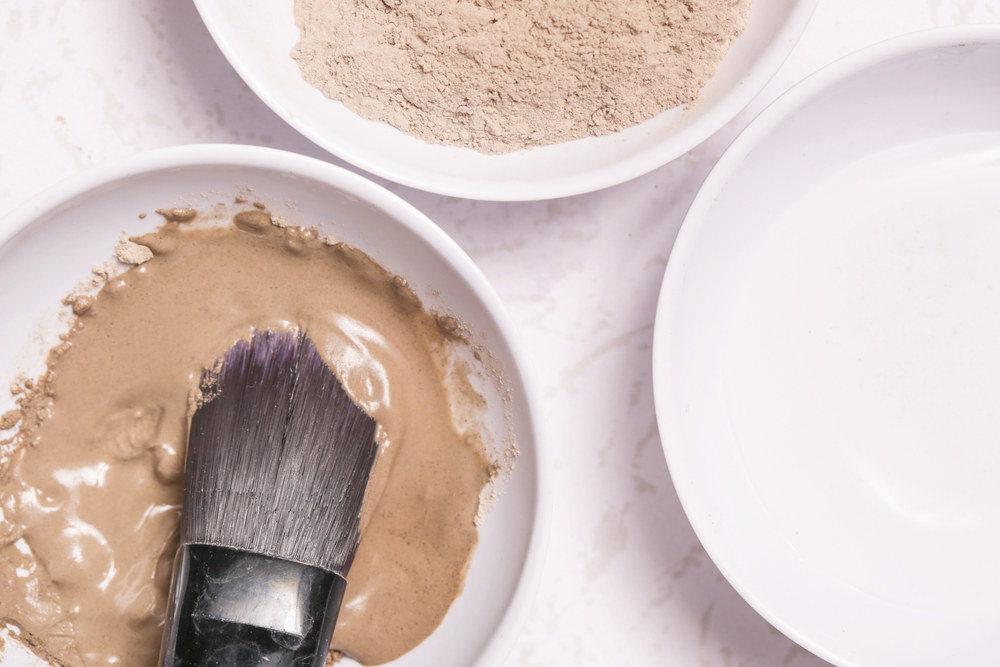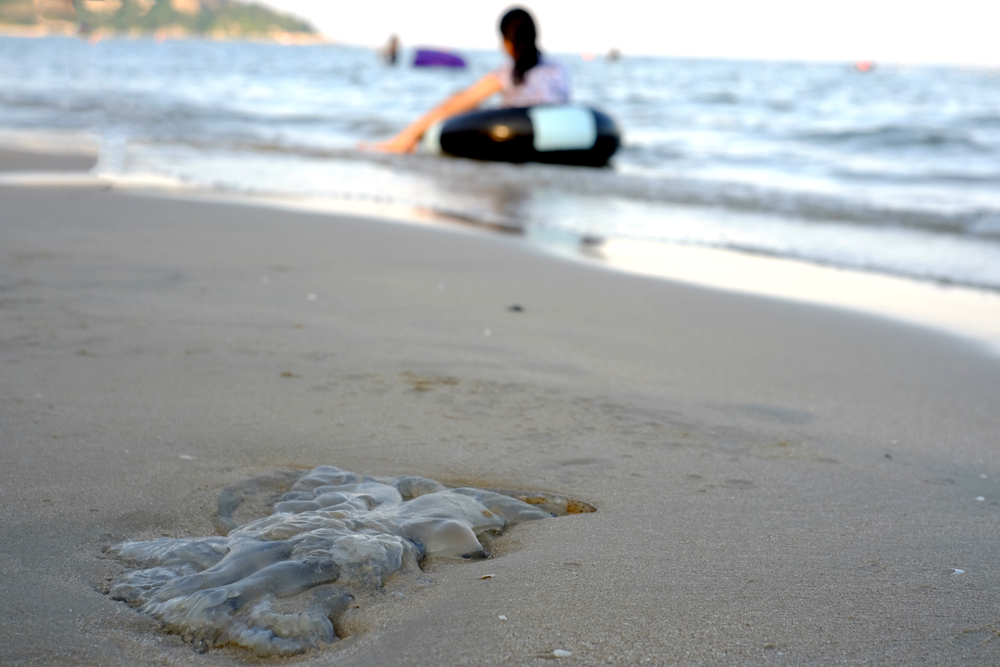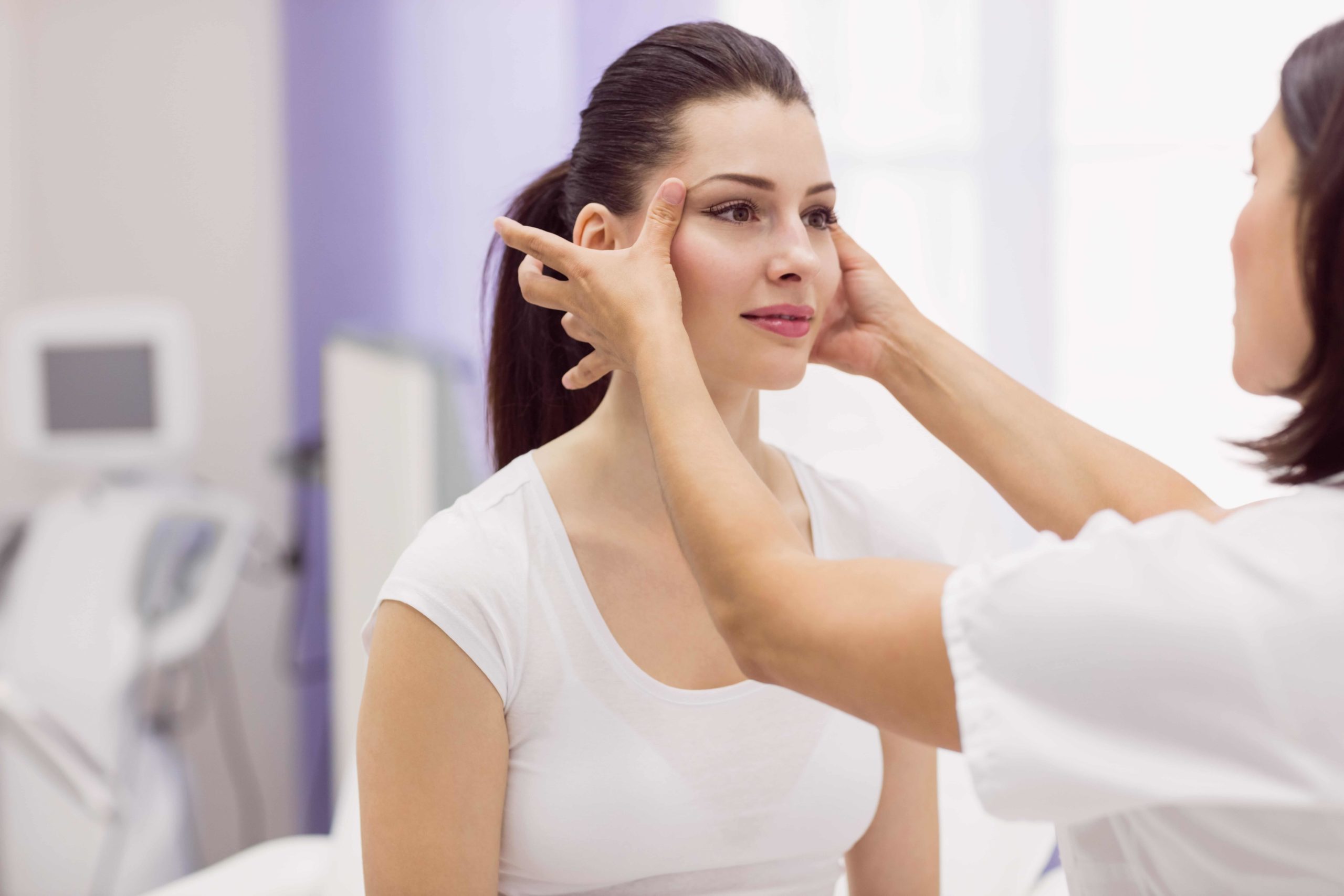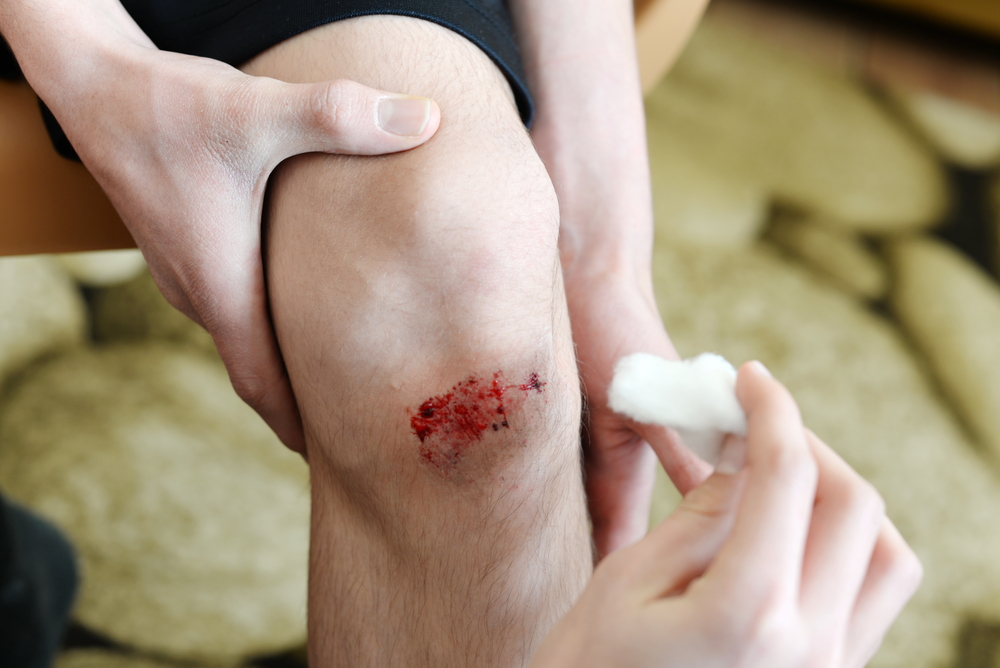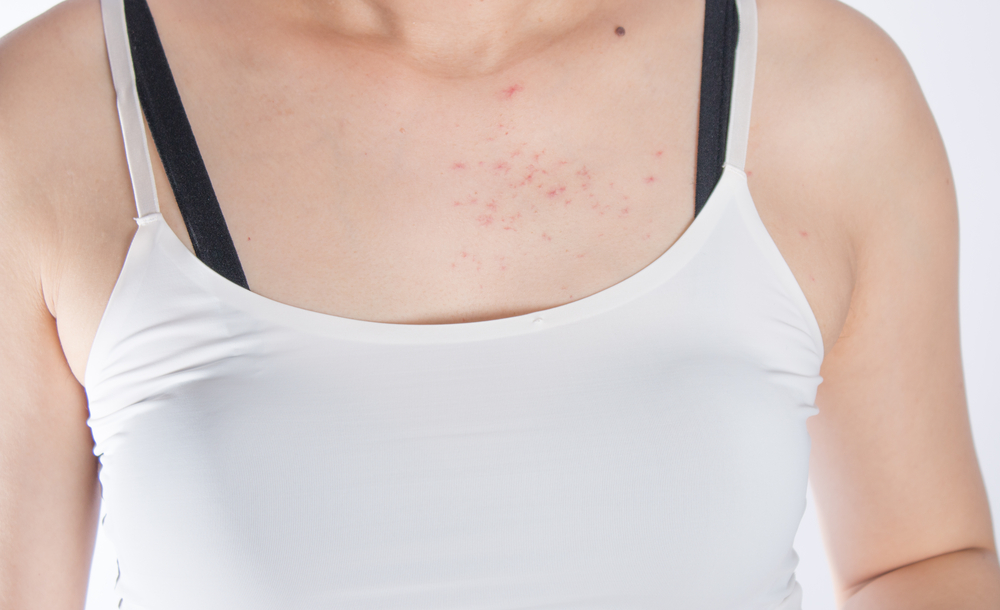- Calcium bentonite healing clay, referred to by some manufacturers as “Indian” or “Aztec” healing clay, is often billed as the world’s most powerful facial.
- The clay has a negative charge which is said to draw positively-charged toxins from the skin.
- The clay does help control the production of certain oils on the skin, making it useful for those who are acne prone.
- You can use this clay to customize your own homemade face masks.
What is bentonite clay?
This healing clay is made from natural calcium bentonite, a porous rock that is mined worldwide, including in several American states. Bentonite is formed from volcanic ash and is soft and easily ground into powder. The powder can then be used to make clay facial masks. With no additional ingredients, it’s skincare at its simplest.
Bentonite clay benefits
There are a variety of claims about the benefits of bentonite for skincare, some of which are supported by research and others that have little or no evidence behind them. Below, we’ve listed the commonly held beliefs about what bentonite can do for your skin, and what science has to say about each of them.
Unclogs pores
Proponents claim that what makes bentonite clay unique—and is the driving force behind many of its skin benefits—is its magnetic nature. When mixed with water, bentonite clay develops a negative electrical charge, which can then be used to draw out positively-charged toxins in the skin. In this way, it is said to rid pores of dead skin cells and other contaminants.
Although we weren’t able to find a clear-cut study that explores bentonite clay’s ability to draw toxins from the skin, we did find studies that support the claim that bentonite has a negative surface charge that can be used to attract or absorb other substances. How much it is able to absorb from the skin is anyone’s guess.
Prevents the overproduction of sebum
Too much sebum—an oily secretion released by your sebaceous glands—leads to pimples and can aggravate acne. Bentonite clay reportedly absorbs sebum and helps to control its production, thus preventing breakouts.
Studies from the early to mid 1980s sought to measure the amount of sebum secreted by human skin. Researchers used bentonite clay to absorb the sebum before measuring it. Although the studies themselves didn’t measure bentonite’s ability to absorb the sebum, they did suggest that the clay was useful for this purpose.
Exfoliates skin
Many people use bentonite clay masks to remove dead skin cells. Like other clay masks, bentonite clay masks tighten as they dry. Dead skin cells reportedly stick to the dried clay and come away when the mask is washed off.
In general, clay and mud masks are considered a less abrasive form of exfoliation than other available skin products.
Softens skin
Assuming bentonite clay exfoliates as promised, it makes sense that it can make your skin softer. Bentonite also contains silica (silicon dioxide), a mineral that promotes collagen growth, strengthening the skin and improving its elasticity, with the added benefit of making it softer.
Reduces fine lines and wrinkles
As mentioned above, silica boosts collagen production. This improved elasticity helps combat fine lines and wrinkles in the skin. The effect might not be as dramatic as with a facelift, but regular use of a bentonite clay mask could bring some noticeable differences.
Evens out skin tone
Exfoliation can also lead to a more even skin tone. When dead skin cells build up on the face and in the pores, they can make the skin look splotchy or leave you with a sallow complexion. Removing those skin cells will make you fresh-faced again.
Improves circulation
Some proponents of bentonite clay masks claim that the mask can increase circulation in the face. In theory, the mask constricts the skin when it tightens, promoting blood flow to that area; however, we have found no evidence that this has been clinically tested.
Makes skin glow
This claim in particular is hard to measure. When people say their skin glows, they often mean that it looks fresh and radiant. Assuming the exfoliating and pore-cleansing properties of bentonite clay masks are real, your skin could look fresh after using a mask.
Helps against bacteria and infection
Bentonite clay is said to protect against bacteria, and there’s some evidence to suggest that it’s beneficial for wound healing. A 2006 study looked at the effects of bentonite on wound healing in rats. It concluded that rats that were exposed to topical bentonite had less scabbing and wound debris than rats that weren’t. However, a more recent study that also looked at rats determined that more research is necessary.
In any case, it is not recommended that you use bentonite clay to treat any kind of infection. If you think you have a skin infection, consult a dermatologist.
Treats acne
Bentonite clay is sometimes used to treat acne. Cleansing pores and absorbing excess sebum would definitely help in the fight against acne, so there might be something to this claim. Some people have used the clay to help with cystic acne, but check with your dermatologist first if you have delicate skin.
Treats other skin conditions
Acne isn’t the only skin condition that bentonite clay is said to help. Some people have used the clay to treat insect bites or even help with eczema or psoriasis. However, we urge anyone who suspects they have a skin disease to have it checked by a dermatologist before attempting to treat it themselves.
» If you suspect that you might have a skin condition and you’re considering bentonite clay, use our virtual consultation tool to discuss your symptoms or find a dermatologist near you.
Other benefits
- Digestive issues such as acid reflux, stomach pain (constipation), gas, bloating, etc.
- Provides minerals to the body
- Oral health, by providing beneficial minerals and destroying oral bacteria
- Freshens breath
Bentonite clay dangers
Bentonite clay does have lead in it, however so do foods that you consume on a daily basis, such as brussels sprouts and sweet potatoes. The amount of lead found in bentonite clay is minimal compared to the common foods we ingest daily.
Ingesting bentonite clay
As you search for your own recipes online, you’ll likely come across clay recipes that you can ingest. Many people choose to eat homemade bentonite clay products, believing that they’ll rid the body of harmful toxins. This claim has not been validated by scientific studies and we can’t stress enough how cautious you should be. Talk to your physician about the risks of ingesting clay before doing so.
Bentonite clay activation
When you purchase healing clay, you will most likely receive a jar of powdered bentonite. The powder, as is, won’t spread easily on your face. You’ll first need to make it into a mask by adding water.
The addition of water is said to activate the clay, giving it its negative charge. It continues to be beneficial as the clay dries. Once it starts to clump, it’s time to toss it for a new batch. Proponents of the clay say that completely dried clay has no skin health benefits. Therefore, it’s unnecessary to leave the clay on your face after it’s dried.
It’s worth noting that water isn’t the only thing that can activate bentonite clay. Metal can also give it a negative charge. It’s best not to store the clay in or near metal containers. Some people also recommend not mixing your clay mask in a metal bowl or with a metal spoon.
RELATED: Peel-off Charcoal Masks — Efficacy, Safety, and Recommended Products
How to use bentonite healing clay
You can find one of these jars of bentonite clay at most natural grocers or online at Amazon, but your job doesn’t stop there. Bentonite clay is best used as a mask—one you’ll need to mix yourself.
Step one: Just add water
Activate your bentonite clay powder with water. It’s up to you exactly how much water you use. Your clay should come with directions. You can also try playing around a bit to find a consistency that works best for you.
Some bentonite clay recipes call for a different liquid, like raw apple cider or apple cider vinegar. You can play around with this a little, but know that simple water is all you really need to make a basic mask.
Mix clay in a non-metal bowl. Consider a wooden or glass bowl. Avoid over-mixing. Stop once you have a smooth paste.
Step two: Consider essential oils
For even more skin benefits (or just a sweeter smelling mask), try a few drops of a recommended essential oil in your mask. Consider tea tree oil for its anti-inflammatory properties or coconut oil for moisturization. If you’re unsure about whether an oil is safe to use on the skin, ask your dermatologist, especially if you have sensitive skin.
Step three: Explore other ingredients
Your bentonite clay mask can be as simple or as elaborate as you want to make it. Some recipes call for oatmeal or even spices to be added to the mix. Just as with essential oils, make sure that these ingredients are safe before including them.
Step four: Wash your face
For best results, it’s always good to start with a clean face. Don’t scrub too hard, your face mask should help with exfoliation.
Step five: Apply the mask
You can apply the paste you’ve made to your whole face or just dab it on select areas. Know that you can’t effectively store bentonite clay after it’s been made into a paste. Only make as much as you’re planning to use.
Some people choose to apply the mask using a cosmetic sponge or cotton ball. However, you can just use your fingers if you prefer. Just make sure they are clean.
Step six: Removing the mask
Allow the clay to stay on your face for 20 to 30 minutes. During this time, you may feel a tightening sensation on your face as the mask dries. It might seem like the mask is making your face pulsate. This is normal. Wash the clay off with warm water and a soft washcloth.
You may feel tempted to leave the mask on for longer than recommended. Once the clay dries, it will have lost all of its benefits and could dry out your skin.
» Want to learn more about bentonite clay mask recipes? Ask a doctor on our forum for more information about how best to use this unique powder.
Where to Buy Bentonite Clay Masks
From acne treatment to digestive aid, the benefits of bentonite clay are clear. What might not be so clear is which form of bentonite clay is right for you. Several brands offer bentonite clay from different sources and of differing grades. Before using any bentonite product, it is important to know that your brand of choice is properly formulated with your specific health goals in mind.
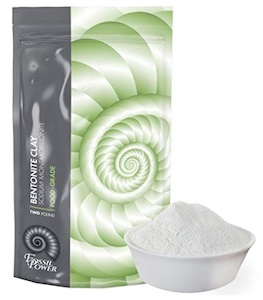
Fossil Power Food Grade Bentonite Clay
When it comes to pure bentonite clay, Fossil Power offers one of the highest quality products available. As a food grade clay, this option is perfect for those seeking digestive relief. When mixed with water or blended into a smoothie, as little as half a teaspoon a day may help address indigestion in an entirely natural way. That said, Fossil Power’s bentonite clay is also perfect for a simple homemade clay mask. By adding a small amount of water to the clay, you can create a powerful and refreshing face mask to address a number of skin issues including itchy skin, bug bites, and acne.
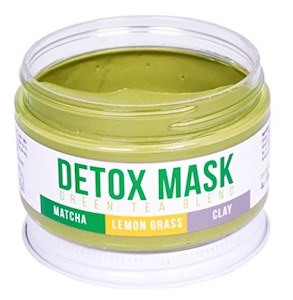
Teami Detox Face Mask
Though many bentonite clay brands offer great DIY mask opportunities, Teami goes the extra mile by crafting a balanced mask with a number of natural ingredients. Matcha tea, lemongrass, and bentonite clay form the backbone of Teami’s mask. The matcha tea helps to reduce fine lines and wrinkles while hydrating skin. The lemongrass cleanses the skin, helping to reduce any bacterial irritations. The bentonite clay then provides its soothing power to the face mask, reducing skin irritations and acne. Teami’s detox face mask is also vegan friendly and 75% organic, making it a perfect option for nearly anyone.
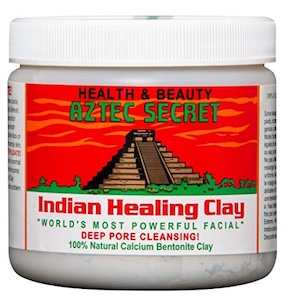
Aztec Secret Indian Healing Clay
Aztec Secret is one of the most popular brands available today and it is easy to see why. Their simple and affordable product is 100% natural green calcium bentonite clay, making it perfect for treating acne and exfoliating skin. While Aztec Secret is not food-grade bentonite clay, it is an ideal body and face mask base that you can customize at home by adding your favorite skin-boosting ingredients.
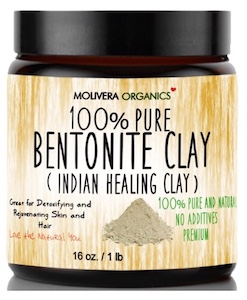
Molivera Organics Bentonite Clay
This 100% pure sodium bentonite clay by Molivera Organics offers another great natural skincare option. Sourced from the volcanoes of Wyoming, this clay boasts its ability to both clear skin and soften hair. Molivera Organics’ clay can also be added to baths for a rejuvenating full-body experience.





